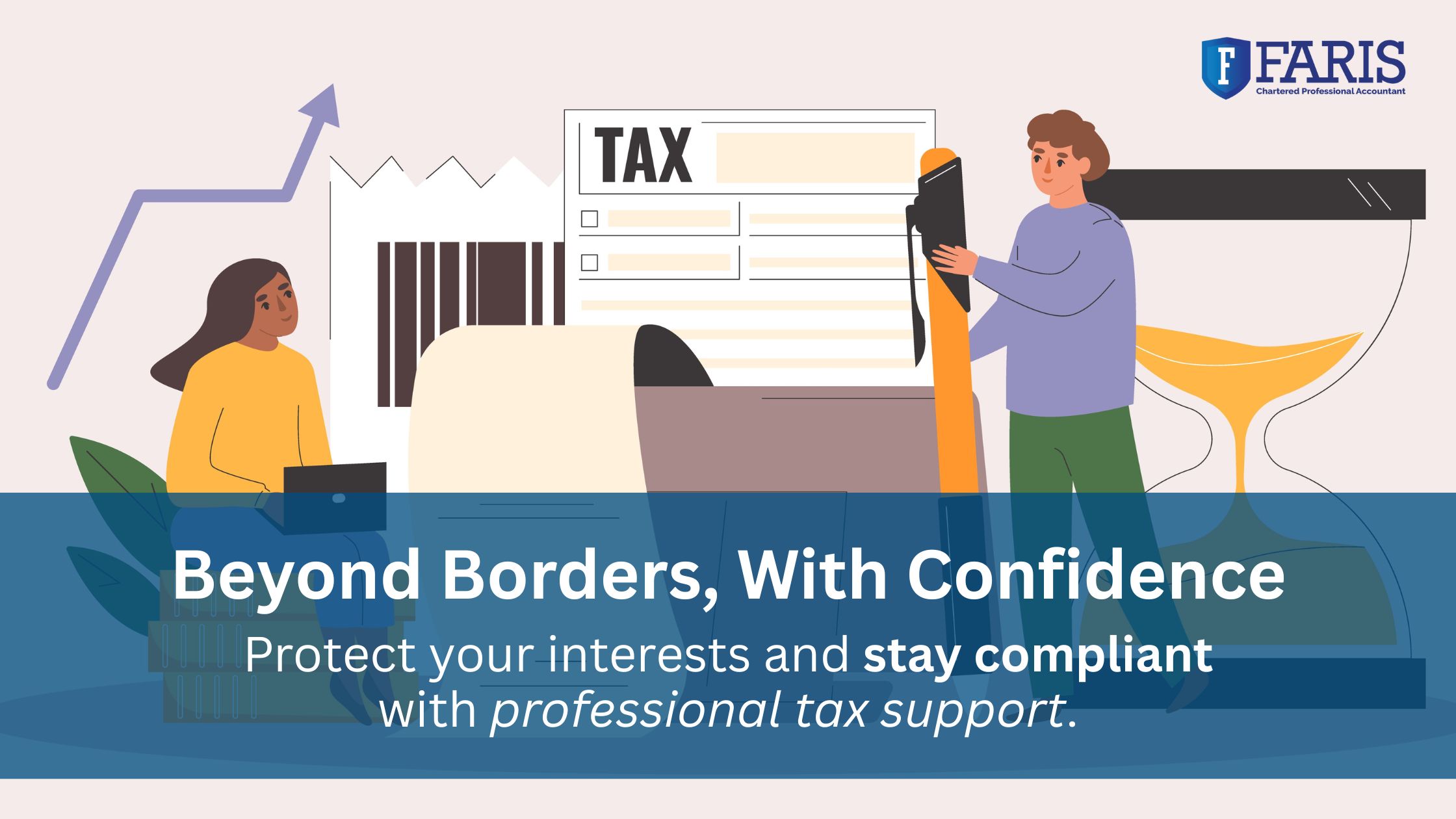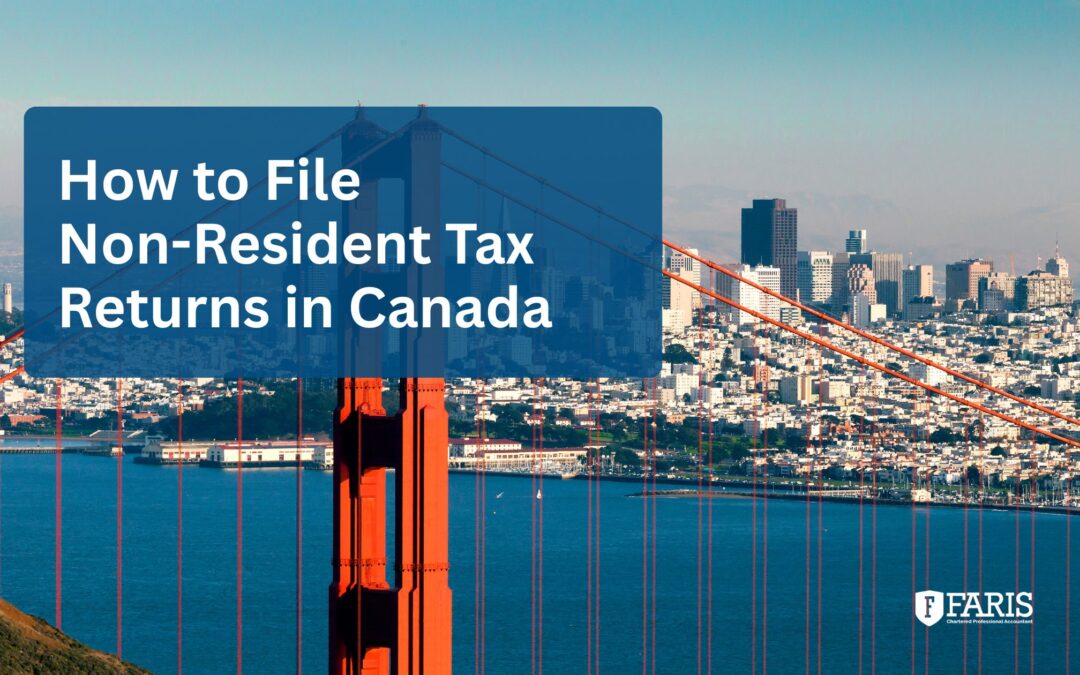As the world gets smaller and more interconnected, it becomes more common for people to work remotely for Canadian companies from outside of the country. They join the significant numbers in the Canadian diaspora who may be required to file a Canadian tax return and pay non-resident tax in Canada.
Taxes are levied by the CRA on individuals who earn income in Canada but are not considered residents for tax purposes. This can include Canadians who are living abroad and foreign nationals who don’t live in Canada who have received Canadian-sourced income, such as employment earnings, rental proceeds, and investment revenue earned in Canada.
If you are unsure about whether you are considered a non-resident, what documentation you need, or how to file your non-resident tax return, it’s crucial to seek tax help from professionals. They can help you navigate the complex world of Canadian tax law and ensure that you are in compliance with all relevant regulations. They can also provide you with legal strategies for reducing your taxes.
Who is Considered a Non-Resident of Canada for Tax Purposes?
The CRA considers you a non-resident of Canada for tax purposes if you “normally, customarily, or routinely” live outside of Canada, are not considered a resident, don’t have residential ties in Canada, and you either live outside of Canada through the tax year or your stay in Canada is less than 183 days of the tax year.
Significant Canadian residential ties include owning a home in Canada or having a spouse, common-law partner or dependants living in Canada. Other ties that may be relevant (referred to as secondary ties) include:
- Owning other property in Canada, like a car or furniture.
- A Canadian driver’s licence or passport.
- Canadian bank account(s), credit card(s) or other economic ties.
- Provincial, territorial or federal health insurance.
- Membership in Canadian-based religious or social groups or other social ties.
If you’ve left Canada, severed your residential ties and established a permanent home in another country, terminating your status as a Canadian resident in the tax year, you may be considered an emigrant. If so, you would only have to file a return if you owe taxes or want to receive a refund for paying too much tax in a tax year.
On the other hand, if you spent more than 183 days in Canada during the tax year, but don’t have significant residential ties in Canada, and you are not considered a resident of another country under the terms of a tax treaty between Canada and that country, see deemed residents of Canada for the rules that apply to you. See also this page on non-resident employers for the tax implications on non-residents who work for non-resident employers.
How Do I Know if I’m a Non-Resident for Canadian Tax Purposes?
If you have no significant residential ties to Canada and the following conditions are met:
- During the entire year, you resided outside of Canada (except if you were a deemed resident of Canada)
- You were in the country for fewer than 183 days during the tax year.
You may be considered a non-resident for Canadian tax purposes. You can apply to the CRA for an assessment of your resident status by filling out Form NR74, Determination of Residency Status (Entering Canada), or Form NR73, Determination of Residency Status (Leaving Canada), depending on your circumstances.

Tax Treaties and Double Taxation
Canada’s network of tax treaties is designed to prevent situations where the same income is taxed by both Canada and another country. These agreements allocate taxing rights so that income such as employment earnings, pensions, or royalties is taxed in one jurisdiction or subject to reduced tax in both. For non-residents, this can mean significant savings compared to the standard Canadian withholding rates.
Reduced Withholding on Certain Income
Without a treaty, Canada generally withholds 25% on dividends, royalties, and some pension payments. Tax treaties often lower this rate, sometimes substantially. For example, a treaty might reduce the withholding on dividends to 15% or less, depending on the country of residence. To benefit, non-residents usually need to file the correct forms with the CRA and may need to provide proof of residency from their home country.
Resolving Cross-Border Tax Disputes
Occasionally, both Canada and another country may assert the right to tax the same income. In these cases, treaties provide a mutual agreement procedure (MAP) that allows the tax authorities of both countries to negotiate and resolve the conflict. This process helps non-residents avoid double taxation and ensures more predictable tax treatment.
Importance of Reviewing Treaty Provisions
Each treaty is different, and eligibility for benefits is not automatic. Non-residents should review the specific provisions that apply to their situation and understand the forms or certifications required. By doing so, they can maximize treaty advantages and reduce unnecessary tax costs.
What Are the Tax Obligations of Non-Canadian Residents?
As a non-resident of Canada, you are only taxed on your Canadian-sourced income and revenue from the sale of taxable Canadian property. The requirement to file a return and the type of tax you pay depend on the type(s) of income you receive.
The two most common types of non-resident tax in Canada are Part XIII and Part I taxes.
Part XII Tax for Non-Residents
It’s essential to inform Canadian payers of the following income types that you are a non-resident for Canadian tax purposes and your country of residence, so that they deduct Part XII tax accordingly on taxable income sources such as:
- Management fees, rental and royalty payments.
- Dividends.
- Pension payments from sources such as CPP, QPP, old age security, RRSPs and other retirement allowances and payments.
If you receive Canadian income subject to Part XIII tax, Canadian payers must deduct this tax when the income is paid or credited to you. The usual Part XIII tax rate is 25%, and this tax is not refundable. You do not need to file a Canadian tax return unless you elect to file a return for receiving timber royalties or rental income from Canadian real or immovable properties or income from certain Canadian pension payments.
Canadian Non-Resident Part I Tax
Examples of Canadian taxable income for non-residents under Part I tax include:
- Canadian employment income or revenues from a business operating in Canada.
- Capital gains from disposing of taxable Canadian property.
- Taxable Canadian scholarships, fellowships, bursaries and research grants.
- Earnings from employment outside of Canada paid by a resident employer.
- Certain types of employment income earned outside of Canada while you were a resident.
While the payer usually deducts Part I tax from these revenue sources, you may still be required to file a Canadian tax return.

How Do Non-Residents File Taxes in Canada?
If you’re a non-resident living in Canada or are filing taxes while living abroad, it is crucial to know whether you need to file a return and which forms to file.
If you are required to pay non-resident tax in Canada, or you wish to claim a refund, your tax return must be filed on or before:
- April 30th of the year after the tax year
OR
- June 15th of the year after the tax year – if you or your spouse/common-law partner operated a business in Canada (unless the business’s expenses are mostly related to a tax shelter).
Canadian Non-Resident Tax Packages
If your only source of income was from employment or a business, use the income tax package for the province or territory where the income was earned in conjunction with Guide T4058, Non-Residents and Income Tax.
If you had other streams of Canadian-based income from sources such as capital gains, taxable scholarships, fellowships, bursaries, or research grants, you must also complete Form T2203, Provincial and Territorial Taxes for Multiple Jurisdictions. If these were your only sources of income, or you received funds from a business that does not have a permanent Canadian establishment, you must use the Income Tax and Benefit Package for Non-Residents and Deemed Residents of Canada.
Paying Taxes and Managing Balances Owed
After filing your Canadian non-resident tax return, the next step is ensuring any balance owed is paid on time. The Canada Revenue Agency accepts payments in several ways, even if you are living outside Canada. Common methods include online banking with Canadian financial institutions, pre-authorized debits directly from a Canadian account, and international money transfers. Non-residents without Canadian banking arrangements often rely on third-party providers approved by the CRA to remit funds securely. Exploring your options early can help avoid delays caused by cross-border transactions.
Consequences of Late Payments
If taxes remain unpaid after the deadline shown on your Notice of Assessment, the CRA will apply daily interest on the outstanding balance. This interest compounds until the debt is cleared, making even short delays costly. Repeated late payments can also trigger penalties beyond interest charges, creating additional financial pressure. Non-residents should take note that international transfers may take longer to process, so payments should be arranged well before the due date.
Handling Overpayments and Refunds
Overpayments can occur if too much tax was withheld at the source, often the case when Canadian payers apply the standard 25% non-resident withholding tax without considering treaty reductions. A common example is withholding tax on foreign dividends. They may also arise if income from multiple sources was taxed at higher rates than necessary. In these situations, the CRA issues refunds once the return is assessed. Refunds may be deposited into a Canadian bank account or mailed to your international address.
Staying Ahead of Your Tax Obligations
Managing balances owed or securing refunds as a non-resident requires proactive planning. Monitoring your assessment notices, setting up payment channels, and understanding refund options all help ensure smooth compliance. Working with an advisor familiar with non-resident tax issues, like Faris CPA, can provide added peace of mind and prevent unnecessary costs.

Special Situations and Exemptions
Non-residents who sell taxable Canadian property, such as real estate, resource properties, or certain shares, face special tax obligations. Generally, the CRA requires a clearance certificate (often referred to as a “Certificate of Compliance”) before the sale is finalized. Without this certificate, the purchaser may be obligated to withhold and remit a portion of the sale proceeds to the CRA. Filing Form T2062 or T2062A allows non-residents to report the disposition and potentially reduce the withholding to reflect the actual tax owing, rather than the default percentage.
Departing or Returning to Canada
Another unique scenario is when individuals leave or return to Canada partway through a tax year. Upon departure, a taxpayer may be considered an emigrant, which requires reporting worldwide income up until the date of departure and potentially paying departure tax on certain assets. Conversely, someone re-establishing Canadian residency mid-year must report both their Canadian-source income earned as a non-resident and their worldwide income for the portion of the year they are considered a resident. These transitions can create complex reporting requirements, and seeking our help protects you and ensures proper compliance.
Credits, Exemptions, and Reduced Withholding
Non-residents may also benefit from various credits, exemptions, or treaty-based reductions in withholding tax. For instance, tax treaties between Canada and other countries can lower the standard 25% withholding rate on dividends, pensions, or royalties. Certain types of income, such as scholarships or research grants, may qualify for partial exemptions under Canadian law.
In some cases, non-residents can also claim non-refundable tax credits for eligible expenses, though access may be limited depending on residency status. Understanding which provisions apply can substantially reduce your tax expense.
Final Thoughts on Filing Non-Resident Tax Returns in Canada
In conclusion, non-resident tax in Canada can be complex, and it’s important to understand your tax obligations if you are a non-resident.
If you need assistance with your tax return or have any questions, don’t take chances on filing an inaccurate return or paying more in taxes than you should. Take advantage of tax consulting services from an experienced professional who is on your side.




